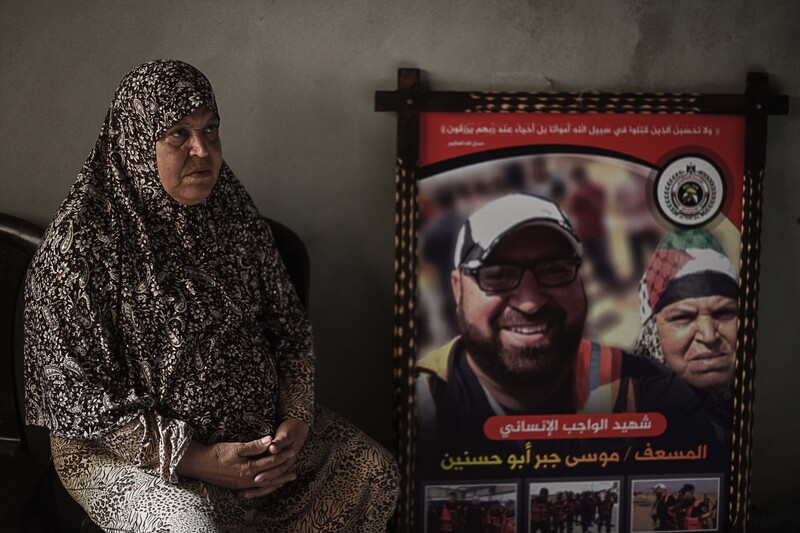The Electronic Intifada 28 May 2018

Shifaa Abu Hassanein sits beside a photograph of her son Mousa, who was killed by Israeli forces earlier this month.
The Abu Hassanein family is trying to mark Ramadan in the normal way. But it has proven impossible.
Nobody could convince Shifaa Abu Hassanein to join the family for an iftar – the meal which ends a day of fasting – as the holy month began.
Three days earlier, Shifaa lost her 36-year-old son Mousa. He was one of approximately 60 people killed by Israel during the Gaza massacre on 14 May.
Mousa was a paramedic – the orange vest he was wearing clearly identified him as such. He was providing first aid to the injured when he was hit by a sniper’s bullet.
“I don’t feel like eating or drinking anything,” said Shifaa. “I can’t even handle the family gathering for an iftar without Mousa. Everything reminds me of Mousa. He used to love the food we had at Ramadan. He would always ask me to make pea soup and rice.”
After the evening prayers of Ramadan, Mousa would “make us tea and come and talk and laugh with us, sometimes for hours,” Shifaa added. “I will miss him badly.”
Shifaa, who is 61, last saw her son at around 4 pm on the day he was killed. She had joined the Great Return March in Malaka, east of Gaza City.
Mousa took a selfie with his mother and gave her a kiss. He then left as he had work to do.
Explosions had been heard in the environs of a cemetery about two minutes drive from Malaka. Mousa made his way to that area. He was equipped with just a few tourniquets, which medical staff had been using to try and stanch the loss of blood from people shot by Israeli snipers.
When he reached the area, Mousa went to treat some injured youths, who were near the fence separating Gaza and Israel. As he approached them, Mousa was himself shot in the chest.
He fell down and was on the ground for 30 minutes before other paramedics could reach him. He was already dead when they arrived.
Rafat Daher, a friend and colleague of Mousa’s, was one of those paramedics.
“We needed time to reach Mousa because we had to search for him amid the fire and smoke,” Daher said. “When we reached him it was too late.”
Before he was killed, Mousa had succeeded in rescuing another colleague, Palestinian Canadian doctor Tareq Loubani. Mousa treated his colleague’s wound after Loubani had been shot with a bullet that penetrated both his legs.
In total, four members of the team in which Mousa was working – including himself and Loubani – were shot that day.
Somber
Usually, Ramadan is a time of joy and color.
This year it opened in a somber mood.
Many of Gaza’s families had to attend funerals for the people killed in the 14 May massacre. Economic hardship – caused by Israel’s siege and the refusal of the Palestinian Authority to pay public sector wages – has also dampened spirits.
“Every year, we make a good profit during Ramadan,” said 50-year-old Zuheir Abu Selmia, who sells kitchen utensils at al-Zawya market in the center of Gaza City. “But this year is different. People can’t afford to buy food and other kitchen requirements for Ramadan. I open from 9 am until 6 pm and often I sell to less than 10 customers a day.”
Israel has repeatedly fired on unarmed demonstrators since the Great Return March began in late March – killing more than 100 Palestinians.
Thaer Rabaa, a 29-year-old resident of Jabaliya refugee camp, was killed while taking part in protests on 6 April.
The pain inflicted on his family has been so acute that they have felt unable to celebrate Ramadan together.
“Thaer was the most cheerful one,” said his mother Etaf. “He was the one who started the conversations and made us laugh. Thaer was the family breadwinner, he worked in construction and supported us. Without him our life doesn’t have a meaning.”
Thaer’s wife Shireen is pregnant. The couple’s baby is due within the next few weeks.
As she fed her 18-month-old daughter Mayar, Shireen said: “How will I provide for my baby? All I have is loss, pain and hunger. Thaer was planning to call the baby Mariam.”
Sarah Algherbawi is a freelance writer and translator from Gaza.





